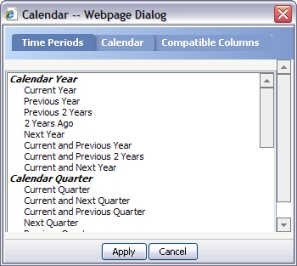 A symbolic date is a system-derived date value, used in the selection criteria of list view and summary view reports, to choose values related to the current date.
A symbolic date is a system-derived date value, used in the selection criteria of list view and summary view reports, to choose values related to the current date.
Some symbolic dates identify a single day, such as Yesterday or Tomorrow. Others symbolic dates define a period (an inclusive range of dates), such as Current Month or Previous Quarter.
You can use symbolic dates for values of Date and DateTime properties.
When evaluated, a symbolic date may produce a single day or a pair of days, depending on the operation in the Condition field.
IS EQUAL TO, the evaluation returns both the starting day and ending day, defining an interval. (For the symbols Yesterday, Today, and Tomorrow, the range is 1 day long.)IS GREATER THAN or IS GREATER THAN OR EQUAL TO, the evaluation returns the starting date. IS LESS THAN or IS LESS THAN OR EQUAL TO, the evaluation returns the ending date. All dates are computed relative to the current day in the time zone of the user (not the time zone of the server). So a user in London (working just after midnight) may find the symbolic date Today is January 1, 2010, but at the same moment, on the same server, a user in California finds that Today evaluates to December 31, 2009. The server may be located in California, England, or in any other time zone.
For example, you may want to include, in a report, only operators who signed on during the current. When running the report on October 16, you can enter October 1 as a starting value and October 31 as an ending value. But later on in November, you need to enter November 1 and November 30.

By using the symbolic date Current Month for both the starting and ending values, the report can be run at any time, with no need to manually compute or re-enter the selection criteria.
For a more complete example, see ![]() Pega Developer Network article PRKB-25634 How to use symbolic dates in report selection criteria.
Pega Developer Network article PRKB-25634 How to use symbolic dates in report selection criteria.
Through field value rules, your application can localize the English names of the symbols to present the symbolic date names in another language. Create field value rules that have Embed-ReportingPeriod as the first key part and pySymbolName as the second key part.
This feature depends on two standard Declare Expression rules with Rule-Obj-Report- as the Applies To key part, to compute the value of target properties pyStartingDate and pyEndingDate.